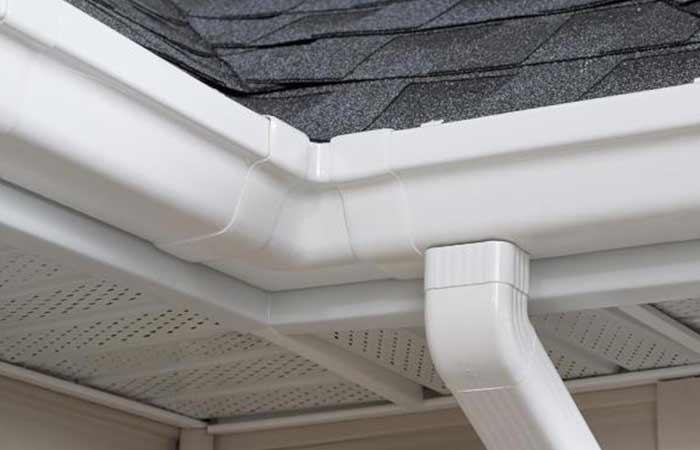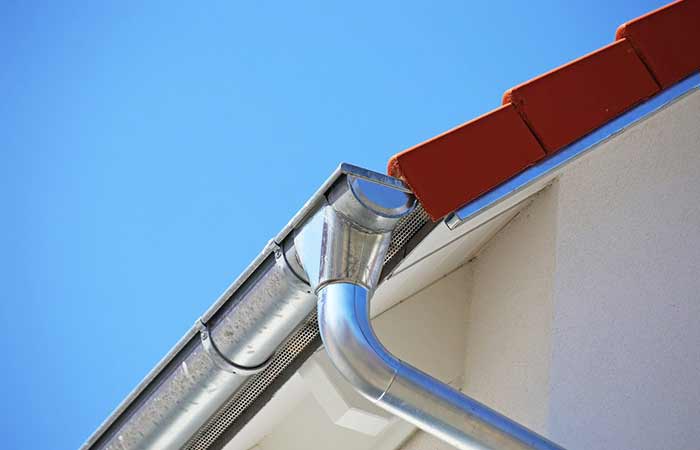Roof gutters are one of those features you rarely think of even when you can’t do without them. Unknown to most people, gutters play some of the most important roles on the house and that is keeping water away from the roof. It might look like a small task but it’s one of the reasons your house will stay in shape for ages.
Some of the tasks your roof gutter plays include protecting the foundation, preventing erosion around the house, protecting the landscape, preventing flooding in the basement, preventing staining on the building, protecting the house painting, and stopping mold and mildew from growing on the house.
At times, however, you might not need gutters at all on your house. Some of the cases you may forego gutters include when the house is located in an area with very little rainfall. Also, the structure of the roof might make it such that almost all the water can be diverted to another area without causing damage to the ground and the house.
Why gutters are important?
Gutters are important for the following reasons:
1. Protecting the foundation
Rainwater can easily pool around the house making it quite difficult to control. This is the case especially when the surrounding landscape slopes towards the house. A wet and dump foundation will get weak with time until it can no longer carry the weight of the building. The building can then sink or simply crumble and fall.
With gutters, however, a lot of the water from the roof will be channeled to a safe place through the downspout. Given that the water from the roof can be a large amount at once, having gutters also prevents having large amounts of water at once just around the foundation.
2. Prevent erosion around the house
The runoff from the rain can be quite heavy especially when there is a lot of rain. If left on its own, this runoff can cause issues to the foundation including eroding the soil around it. Large streams of water gain mass from collecting on the roof and momentum from falling from the roof to the ground. If they hit bare ground, they will loosen the soil quite quickly and thus erode it. It’s the reason why you can see well-defined holes on the ground around a house without a gutter.

3. Protect the landscape around the house and home in general
When the water from the roof is allowed to hit the ground directly, it’ll dig holes with time. Besides that, it’ll start eroding the ground. If not taken care of, it can create small valleys which can turn into larger valleys if the house is on a steep slope. This can be quite unsightly around the house.
With gutters, however, such depressions on the ground won’t form as the water will be managed easily. Direct rain from the sky isn’t often enough to create valleys on the ground like that from the roof.
4. Prevent flooding in the basement
When your house is on the downward side of a slope, flooding in the basement can be a major problem as water from uphill will tend to collect around it. Without a gutter, the problem is further escalated as it means the runoff from the roof also adds to the water around the house. This can easily flood the basement.
To deal with this issue, you can create terraces above the house on the slope to direct the water away from the house. You then add gutters on the roof to direct the runoff into a downspout which should preferably be on the downslope of the house.
5. Prevent staining on the building
For houses with a short overhang, the water from the rain will flow down the wall thus leaving stripes of dirt similar to the tiger stripes found on the outside of gutters. This can be quite hard to get rid of no matter the finish of the house on the wall. If you have wooden walls, it’s a worse case since the water will rot the wood away if it’s allowed to flow on the wall.
Gutters prevent this from happening by collecting the water from the roof and safely directing it away from the wall.
6. Protect the house painting
As noted above, a house without gutters and with a short overhang will have rainwater from the roof flowing down the wall. If your wall is painted like most walls are, the water will eventually damage the painting by either staining it or peeling it off. This can make your house quite ugly and increase maintenance costs considerably.
7. Protect the fascia board
The fascia board is the long, straight board that runs along the lower edge of the roof. Without a gutter, it’s quite hard to keep rainwater from flowing down this board. No matter the type of materials the fascia board is made up, it’ll get damaged over time when exposed to the rain.
The rotting of the facial board can also grow onto other parts of the roof and will need costly repairs in the end.
8. Stop mold and mildew from growing on the house
Gutters also play the role of keeping mold and mildew (and other unwelcome plants) from growing on and around the house. Mold and mildew and even ferns only need some little wetness and a surface to grow. When rainwater isn’t controlled properly, they will grow on the facial board, wall and even in the basement.
9. Collect water
The other major role gutters play is collecting water for a purpose of your choice. You can have the downspout pour the water into your flower garden, lawn or even tank where you can use the water for other tasks. You might be surprised how much water you can collect from a small section of the roof.
With gutters on your roof, you can enjoy these benefits each time you have rain or snow.

When are gutters not necessary?
In some cases, however, you might not even need gutters on your house. Some of these cases include the following:
1. When the area has little rain or snow
If you live in an arid or semi-arid area or one without any significant amount of rainfall or snow, installing gutters will mostly be a waste of time and money for you. This is because you won’t have any of the above benefits especially when the roof is designed properly with a good overhang and other aspects discussed below.
2. When the land slopes away from the house
If the land around your house slopes away from your house such as being at the top of a hill, you won’t need gutters as much given that the water from the rain or thawing snow will simply flow away from it. You won’t deal with flooding in the basement or any other issues.
3. You have surrounded your home with concrete
If the area around the home and the house especially is surrounded by concrete that’s impervious to water, you may not need gutters. Rain falling from the roof will simply hit the ground and flow to the rest of the compound or other place you might direct it.
4. Your roof has a long overhang
A roof with a long overhang means that the water will be dropping further away from the roof than if it had a short overhang. As long as the water will flow away from the house after that, you might actually not need gutters after all.
5. You have a slab for a roof
A roof that’s a slab or made of concrete won’t necessarily need a gutter as you can simply add a spout to direct the water slightly away from the roof and you’re safe from damage from the rain water. Even then, adding gutters on concrete roofs isn’t very ideal as they lack most of the features found on conventional roofs such as an overhang and facial board.
6. The roof directs water to one side only
If your roof slants only to one side and doesn’t damage the ground in any way, it’s easy to forego the installation of a gutter. Flat-roofed buildings are the best for this case as you will only be needed to build concrete or a long overhang on one side of the roof.
With these aspects, you can be sure that your roof and house as a whole will be in good shape even without a gutter installed.
Do I need Gutters around my Entire House?
You don’t need gutters around the entire house. Gutters are only needed on the downslopes of the house. For example, if the roof slopes only to one side, put gutters on the downslope. If the roof slopes in two directions with a ridge in the middle, add a gutter to it on both sides. If it has multiple slopes and some are very short such that they collect little water, add the gutter to the large slopes only.
More on Gutters
- How Long do Gutters Last?
- Do Gutters Cause Ice Dams?
- How to Fix a Sagging Gutter
- How to Install Gutters Without Fascia Board
- Vinyl vs Aluminum vs Steel Gutters: Differences, Pros & Cons
- Rain Gutter Alternatives, Low Maintenance, Cheap & DIY Options
- Rain Diverter vs Gutter-Differences & Similarities
As an Amazon Associate, we earn from qualifying purchases. Details here

It was really helpful when you discussed how mildew and mold can be prevented by a proper gutter system. These two things are extremely worrying to have as a homeowner, and I’ve recently heard many of my friends dealing with it and having to spend a lot of money in the process. I’ll take your advice and make sure I get a proper gutter system installed by a professional so this won’t be a problem for me.